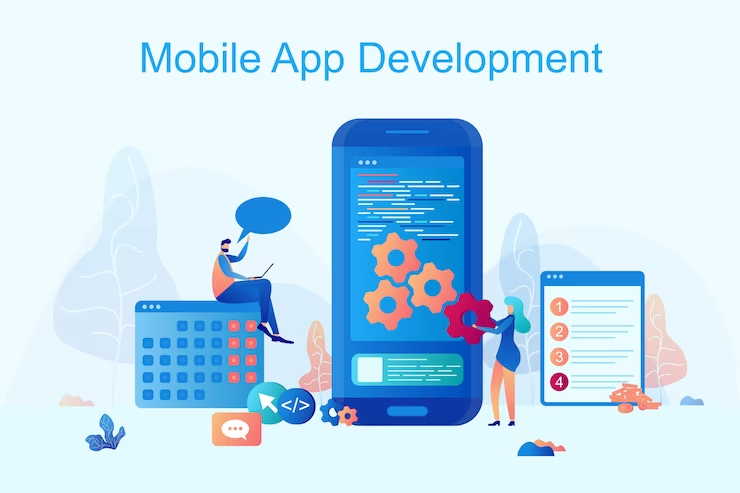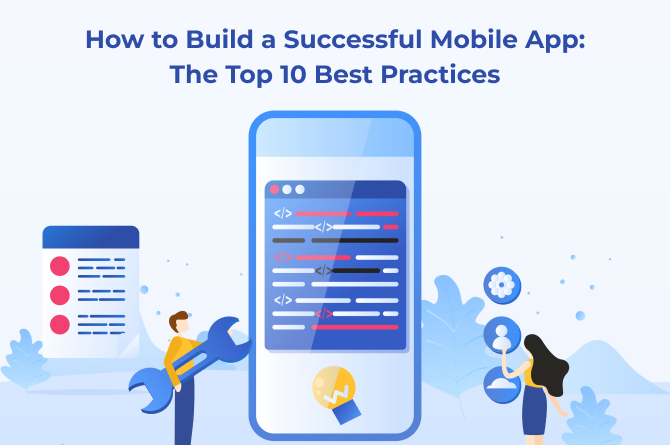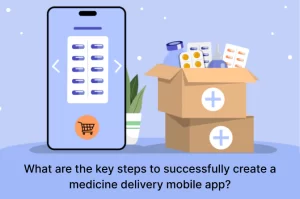Mobile apps are no longer a last-minute decision for businesses. The entire world is becoming smarter, shifting from desktops to laptops and now mobile devices. In order to remain competitive and expand, most businesses look to pick the best mobile app development company India. And, like consumers, corporate users want simplicity and constant development so having a mobile app is a necessity if you want to stay relevant as a business or help your clients.
Did you know that by the end of this year, mobile apps are estimated to generate $188.9 billion in income from app stores and in-app ads according to statista. Many businesses are striving to capitalize on these trends by establishing mobile applications, but relatively few are aware that a successful mobile app is supported by a carefully developed mobile software development process carried out by an experienced and specialized team.
The mobile development process is separated into several phases that are determined by the size of the app project as well as the app’s primary features and functioning. This article will address how to design a successful mobile app, as well as the top best practices that will aid a mobile app’s long-term viability.
So, let’s begin!

Best Practices for Mobile App Development
1. Analysis Market: Shifts, Targeted Audience, and Competitors
The first step in building a successful mobile app is to do a deep analysis of the upcoming trends and competitors that should not be overlooked. It will assist you in determining the potential of your targeted market, who will use your mobile app, and the barriers to entry.
- Understand the market trends: Knowing what’s trendy in the mobile app industry is essential for any mobile developer who wants to keep their product up-to-date. One mobile app that meets the needs of one person is no longer a trend. Customers are increasingly interested in all-in-one solutions that allow them to handle various problems. As a result, there are so many other useful apps to create a new mobile development trend to consider.
- Identify your audience and discover their needs. Understanding users in depth will help you understand market needs, identify potential customer acquisition methods, and engage with them. By looking for statistics or conducting surveys, you can obtain mass audience data (including demographics, user behaviors, and motivations) or narrow down the target consumers (perfect for aiming an innovation toward a niche).
- Analyze competitors: The rivals whom you choose to compare with should have similar industry goals. Consider start-ups and even leading corporations, assess their strengths and limitations, and then include them in your mobile app development planning.
2. Create a strategic plan for a mobile app
A mobile app strategy will assist you in ensuring that the product achieves its original objective while saving time and money on surplus development, features, and updates. A solid strategy should take into account the overall business strategy and mobile app concept, as well as the development, design, marketing, and management plans.
You can plan, prioritize tasks, and build on the mobile app roadmap at this stage to ensure the product’s time-to-market. The strategy and processes should be divided into small, achievable parts, which will make tasks easy for you and your team.
3. Concentrate on the customer experience
According to Google research, poor mobile experiences diminish the likelihood of users continuing to use the app by 63%, regardless of how appealing or data-driven your marketing efforts are. As a result, all steps of your mobile app development process should aim to optimize user pleasure in order to increase user support and reduce the likelihood of app.
Because a large number of users will use your mobile app over time, it is critical to prioritize the digital customer experience. Ease of use, convenience, and quickness are all factors that can contribute to a great experience. However, because the costs of improving the customer experience may occasionally exceed the budget, you must also guarantee that time, money, and efforts are wisely spent.
4. Treat Security with the maximum Primacy
When the mobile app is deployed, a pool of user data and sensitive data will flood into your system. Although the type of information varies based on the functionality of your app, it is your responsibility to protect all user data.
Some best practices for keeping your data secure are:
- Creating secure code or purchasing secure external source code.
- Encrypting sensitive personal data properly, such as the cache, local database, or API communication.
- Tokens are used to validate identities, with unique tokens assigned to each device and configurable session lengths.
- Having a plan in place for data backup or disaster recovery.
- To keep up with the latest data security technology, consult a reliable data analytics service provider.
5. Create a simple yet intuitive UI/UX design
The design of an app is one of the most important factors in its success. This holds true for both B2C and B2B mobile apps. People nowadays prefer mobile apps with a simple yet straightforward UI/UX. A basic UI, for example, will help your audience utilize the app more quickly and efficiently, whereas instinctive UX helps users grasp and use the app right away.
There are numerous benefits to having a well-designed UI/UX. A quick onboarding process will keep users engaged with your software, while a user-friendly registration procedure will enhance user acquisition and download rates.

6.Implement Automation Testing
Automation testing is an efficient technique to execute tests since it saves time on repetitive tasks and decreases the likelihood of human error. Improving the digital app’s time-to-market is especially important under the Agile methodology. As a result, your development team should consider test automation to accelerate the testing process while ensuring faultless functionality.
Furthermore, with so many automation testing solutions on the market, it stands to reason that not all of them will be perfect for your specific needs. The following are some criteria for assessing automated testing tools:
- Project’s budget
- The QA team’s experience and knowledge
- Capability to fulfill your testing requirements: Will the tool be compatible with the mobile platform? Is it possible for testers to write test scripts in their preferred language?
- When other solutions enable online testing, Kobiton is a scriptless test automation tool created exclusively for mobile devices. The tool provides comprehensive functionality to assist you in running practically all mobile app test cases.
Ensure your team is on the same page
Unproductive employees are 2.8 times more likely to be uninformed of their goals and expectations. So, before allocating duties to the development team, make sure that each member of your mobile app development team understands the products and knows what they are working on.
Frequent meetings and open communication can help you remind them of their goals and responsibilities while also motivating them to come up with new ideas. Furthermore, video conferencing and messaging systems such as Google Meet, Zoom, Slack, and others are worth considering for successful communication.
8. Integrate with third-party
App stores provide an ecosystem in which numerous developers can publish their programs and customers can find them. Given the vast number of mobile apps that have been developed over time, app stores must set tight restrictions and criteria that developers can adhere to. Because certain app stores will analyze an app’s safety features or overall performance, becoming familiar with these criteria will assist you in avoiding app store rejection.
Furthermore, keep in mind that when you launch products on marketplaces, you will be competing with a multitude of apps that are similar to yours. As a result, in addition to the development plan, you must also consider the marketing strategy.
9. Keep app store guidelines in mind and create a marketing strategy
App stores provide an ecosystem in which many developers can publish their programs and customers can find the ones they want. Given the large number of mobile apps produced over time, app stores must implement strict regulations and criteria that developers can follow. Because certain app shops will inspect an app’s safety features or overall performance, familiarizing yourself with these criteria will help you avoid app store rejection.
Furthermore, when launching items on marketplaces, keep in mind that you’ll be competing with a plethora of apps comparable to yours. So, in addition to the development plan, you must also focus on marketing strategy.
10. Update the mobile app based on User feedback
Often, collecting customer feedback and using it as a metric for the next mobile app update will help you improve the user experience. Some possible ways to gain insights into how users interact with your mobile app are:
- Check the review section in app stores: Users often go to the marketplace to leave comments and rate the app. You can also find some mobile app issues that users may face in their reviews.
- Ask for feedback: By sending emails, in-app messages, or even calling, you can ask for their thoughts about the product.
- Implement mobile app analytics platforms: Mixpanel is a tool that can help you analyze the customer journey in the app, prioritize what matters, make decisions quickly, and prepare for the next updates better through data.

Some Benefits of Developing a Mobile App
- Provide sufficient value to the potential customer
Business growth tendencies have shifted dramatically in recent years. Big Companies and businesses now rely on technology and strive to develop new features for the convenience of their potential customers. Mobile applications are considered modern-day technology employed in business, and they have transformed shopping habits while meeting all of the customer’s needs. These apps make life easier for clients by putting everything in one location.
- Stronger bond with customers
It has been discovered that if you give your customers everything they want, they will trust your brand and respect your items more. Every brand must make concerted efforts to become a customer favorite and fulfill its objectives.
- Fast and easy source to connect with customers
Customers in the present era are primarily concerned with how fast and easily they may obtain the information they require about any organization. One of the primary points from which the business grows is customer support. If you want to provide quick client service, a mobile app is the ideal alternative. It is a trustworthy, likable, and convenient source for the greatest experience.
- Enhance customer loyalty
Every successful business always has a high customer retention rate. When you deliver high-quality services to your potential clients, it is obvious that they will rely on your brand and products and promote them to others.
Introducing loyalty programs is one of the most effective strategies to capture the attention of your customers. To implement those loyalty programs, mobile apps might be highly advantageous. You can provide your consumers with instant awards and product recommendations based on their preferences.
- Competitive edge in your niche
Gaining a competitive advantage over possible competitors is a major task in and of itself. Mobile apps may adapt, offering you a competitive advantage in your sector. When your potential customers can acquire what they want with the comfort of their smartphones, they will undoubtedly return.
Final Words on How to Build a Successful Mobile App
So that’s it for making a successful mobile app because it’s not an easy task to do. The development of a mobile app is a never-ending process, as all types of businesses, today demand a mobile app. In response to user input, you must make tweaks and changes. The addition of new features is another significant component.
So, if you’re looking for a mobile app development company India, get in touch with us right now for more information. We have a mobile app development staff that is highly specialized and experienced.







